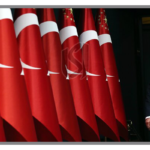
Erdogan’s victory in Turkish elections
- هلدینگ ترکیه با ما
- جولای 16, 2023
- BlogEN
- Erdogan's
- 0 دیدگاه
Turkiye’s Elections and Recep Tayyip Erdogan: A Comprehensive Analysis
Turkiye, a nation straddling Europe and Asia, has witnessed significant political developments, particularly surrounding its elections and the prominent figure of Recep Tayyip Erdogan. This article provides a comprehensive analysis of Turkiye’s elections, focusing on Erdogan’s rise to power, his presidency, and the implications for the country’s political landscape.
1. Historical Background:
To understand Erdogan’s prominence in Turkish politics, it is essential to examine the historical context. Erdogan, a member of the Justice and Development Party (AKP), became prime minister in 2003 and served until 2014 when he assumed the role of president. Under his leadership, Turkiye experienced significant economic growth and social transformation.
2. Erdogan’s Rise to Power:
Erdogan’s ascent to power can be attributed to several factors. As prime minister, he implemented economic reforms, attracting foreign investment and boosting Turkey’s global standing. Additionally, he championed socially conservative policies that resonated with a significant portion of the population. However, his tenure also faced criticism for alleged authoritarian tendencies and the erosion of democratic institutions.
3. The Consolidation of Power:
Erdogan’s presidency marked a turning point in Turkish politics. Through a constitutional referendum in 2017, he transformed Turkiye’s parliamentary system into an executive presidency, consolidating more power in his hands. This move sparked debates about the concentration of power and concerns over the erosion of checks and balances.
4. Electoral Victories and Opposition Challenges:
Erdogan’s AKP enjoyed electoral success in various elections, including parliamentary and presidential contests. The party’s ability to secure victories can be attributed to its strong support base, effective campaigning, and the fragmentation of the opposition. However, opposition parties have emerged as formidable challengers in recent years, presenting alternative visions for Turkiye’s future.
5. Controversies and Challenges:
Erdogan’s presidency has been marked by controversies and challenges. The government’s handling of protests, restrictions on freedom of expression, and crackdown on dissent have drawn international criticism. Additionally, Turkiye’s strained relations with the European Union, human rights concerns, and geopolitical complexities have added further challenges to Erdogan’s leadership.
6. Implications for Turkiye’s Political Landscape:
Erdogan’s continued presence in Turkish politics has far-reaching implications. The AKP’s dominant position, coupled with Erdogan’s charismatic leadership, has shaped the country’s political landscape. However, growing dissent, economic challenges, and societal divisions present uncertainties for the future of Turkiye’s political scene.
7. International Perspectives:
Turkiye’s elections and Erdogan’s presidency have also attracted attention from the international community. Relations with key global actors, such as the United States, European Union, and neighboring countries, have experienced fluctuations. Understanding Turkiye’s internal dynamics is crucial for comprehending its role in regional and international affairs.
Turkiye’s elections and the rise of Recep Tayyip Erdogan have had a profound impact on the country’s political landscape. Erdogan’s tenure as prime minister and subsequent presidency have brought about economic growth, social change, controversies, and challenges. As Turkiye navigates the complexities of domestic and international issues, the role of Erdogan and his party will continue to shape the nation’s trajectory. It remains to be seen how Turkiye’s democracy and political institutions will evolve in the years to come.
In order to get more information, you can contact the (With Us) collection
Erdogan’s Impact on Turkiye
The Impact of Erdogan on Turkiye’s Administrative, Economic, Political, and Social Landscape
This article examines the multifaceted impact of Recep Tayyip Erdogan on Turkiye’s administrative, economic, political, and social dimensions. By analyzing his leadership tenure and policy decisions, we aim to provide a comprehensive understanding of the changes and challenges Turkiye has experienced under Erdogan’s rule.
Recep Tayyip Erdogan has been a dominant figure in Turkish politics since assuming office as Prime Minister in 2003 and later as President in 2014. His leadership style, policy decisions, and political ideology have significantly influenced Turkiye’s trajectory across various domains. This article explores the consequences of Erdogan’s governance in terms of administrative restructuring, economic policies, political landscape, and societal transformations.
1. Administrative Reforms:
Under Erdogan’s leadership, Turkiye witnessed significant administrative reforms aimed at centralizing power. This centralization process led to the restructuring of governmental institutions, changes in the bureaucracy, and alterations in decision-making processes. These reforms have garnered both praise for enhancing efficiency and criticism for consolidating power and weakening checks and balances.
2. Economic Policies:
Erdogan implemented an ambitious economic agenda with a focus on promoting growth and development. His government pursued a policy of market liberalization, attracting foreign investment, and encouraging domestic entrepreneurship. However, concerns have been raised regarding the concentration of economic power, growing income inequality, and the impact of political interference on the independence of economic institutions.
3. Political Landscape:
Erdogan’s tenure witnessed a transformation of Turkiye’s political landscape. His Justice and Development Party (AKP) consolidated power, leading to a more dominant role for Islam in the country’s politics. Erdogan’s leadership style, characterized by populism and nationalism, has polarized society and led to a significant crackdown on political opponents, civil liberties, and media freedom. This has raised concerns about the erosion of democratic values and the rule of law.
4. Societal Transformations:
Erdogan’s leadership has had a profound impact on Turkish society, particularly in terms of cultural and social dynamics. Policies promoting conservative values and Islamic identity have been implemented, leading to changes in public spaces, education, and social norms. While these measures have been supported by conservative segments of society, they have also sparked debates over secularism, women’s rights, and individual freedoms.
5. Challenges and Criticisms:
Erdogan’s tenure has faced significant challenges and criticisms. Critics argue that his policies have undermined democracy, stifled dissent, and infringed upon human rights. Additionally, concerns have been raised about the polarization of society, the weakening of democratic institutions, and the erosion of the separation of powers.
Recep Tayyip Erdogan’s leadership has had a profound impact on Turkiye’s administrative, economic, political, and social landscape. While his supporters praise his contributions to economic growth and assertiveness in international affairs, critics raise concerns about the erosion of democratic values and the concentration of power. Understanding the multifaceted implications of Erdogan’s governance is crucial for comprehending Turkiye’s current state and its future trajectory.
Note: The article aims to provide a balanced analysis of Erdogan’s impact on Turkiye; however, it is important to acknowledge that perspectives on this topic may vary.In order to get more information, you can contact the (With Us) collection


یک دیدگاه ارسال کنید